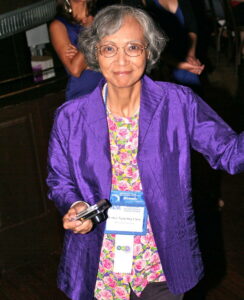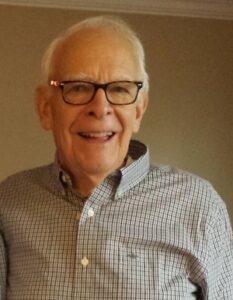Interview With ASA Immediate Past President Prudence Carter
By: Prudence Carter & Raina Hackett & Gillian Niebrugge-Brantley
In September 2023 staff of The Sociologist (hereafter TS) had the opportunity to interview Dr. Prudence Carter, who had just concluded her August 2022 - August 2023 term as president of the American Sociological Association (ASA). The interview, presented below edited for clarity, offers an insightful reflection on the state of the ASA, sociology, the US, and each of us as sociologists; and leaves one grateful for the people who serve as elected officers and staff of our largest professional association. TS: What achievement are you proudest of as ASA president? That is a harder question to answer than it…
Read MoreIntersectional Solidarities: Building Communities of Hope, Justice, and Joy
By: Joya Misra
Editor’s note: Dr. Joya Misra was elected 115th president of the American Sociological Association in Spring 2022, and became president in August 2023. What follows is a condensed version of a January 2023 talk she gave as president-elect to the District of Columbia Sociological Society, provided by her to The Sociologist. The theme for the 2024 American Sociological Association meetings is “Intersectional Solidarities: Building Communities of Hope, Justice, and Joy.” I believe that hope, justice, and joy are what we, as sociologists, need to be centering. While calls for social justice are more consistent within sociology, we engage less with…
Read MoreRemembering a Scholar, Mentor, Colleague, and Friend
By: Gay Young
Professor Emerita Esther Ngan-ling Chow was a member of the faculty in the Department of Sociology of the College of Arts and Sciences at American University (AU) for more than 35 years. I am honored to have been her colleague in the department for nearly 25 of those years. Many years ago, when I interviewed for the job at AU, the Arts and Sciences dean at the time had the practice of asking prospective faculty members a very pointed question: among AU faculty, whose scholarly work do you know? But that was an easy one for me. The answer: Esther Chow, who at…
Read More
Remembering John P. Drysdale
By: Patricia M. Lengermann & Gillian Niebrugge-Brantley
We first met John Drysdale in 1997, at the beginning of a long (but finally successful) struggle to establish the American Sociological Association Section on the History of Sociology (today the History of Sociology and Social Thought). The meeting came about, as did many things in John’s long and happy marriage, through his wife Susan Hoecker-Drysdale. She had reached out to recruit to our fledgling effort, and we knew her for her important work Harriet Martineau, First Woman Sociologist. John, like Susan, proved to be an invaluable supporter—deeply knowledgeable about the history of sociology, open to new interpretations, and committed…
Read More
A Researcher's Story on Uncovering the Truth Behind WIC
By: Raina Hackett
As I write this in January 2024, Congress just passed a spending bill that will keep the government open until March, with another spending crisis on the near horizon. Due to unprecedented political polarization and, quite frankly, petty politicking, this has become the new normal, and as a congressional staffer, I have been monitoring these debates and analyzing their effects on the American people. Simultaneously, during the first wave of spending crises, I was working on research uncovering and substantiating the role of former Rep. Shirley Chisholm (D-New York) in creating the Special Supplemental Nutrition Assistance Program for Women, Infants,…
Read MoreDocumentaries in Sociology
By: Courtney Bell
When I started my master’s degree at American University, I told several of my professors that I had worked on a documentary exploring the institution of marriage. The response to this information was nearly always the same: professors would say “You know, I’ve always thought my research would make a great documentary, but I just have no idea where to begin.” When I entered the public sociology Ph.D. program at George Mason University, it was essentially same reaction, different faculty. As I progressed in my public sociology coursework, I found that almost all of my reading assignments were from peer-reviewed…
Read MoreHarold Cruse, Black Intellectuals, and Reconstructing Black America
By: Rutledge M. Dennis & Kimya Nuru Dennis
Introduction This paper re-introduces a much neglected classic: Harold Cruse’s epic book The Crisis of the Negro Intellectual, published in 1967. A time of hope and optimism, but also a time of despair, protest, discontent, and rebellion. The ‘60s was a crucial decade because America seemed reluctant to address unresolved issues: segregation versus integration in schools, employment, churches, housing, dating, and marriage. Then there was the Vietnam War which raised moral as well as economic issues—can we have both guns and butter, or must we choose between the two? It is such a juncture that prompts scholars, intellectuals, and ordinary…
Read MoreRevisiting Transracial vs. Transgender Identity
By: David Reznik
A reflexive statement to start: I am a White cisgender man and the perspectives I offer here are to be interpreted within that context. I acknowledge the intersectional privileges I experience, including the opportunity to express my viewpoints below at a time of extraordinary violence directed at Black and trans* communities across the United States. My hope is that the ideas I offer in this essay help to bolster the struggle for social justice and further all forms of solidarity with those whose marginalized and oppressed identities I discuss. I thank The Sociologist’s editors and reviewers for their helpful feedback…
Read MoreAsk a Sociologist: Racism in the Courts
By: Nakim Ryan
From our mailbag (edited for clarity): Hi. I have a question specifically on studies relating to what is considered the institutional racism against African Americans in the criminal justice system. I was told the many studies that show a disparity between Whites and Blacks in sentencing, which is said to prove racial bias in the justice system, are invalid due to the fact that they do not take into account how many Black people on average are held in contempt of court, and lawyer ability. Because of the lack of ability to even take these things into account, a study…
Read MoreEvents
Don't miss out on local events here in the DMV area. Check out our schedule!
Submit
Contribute to The Sociologist
DCSS
Join the District of Columbia Sociological Society
Ask Us
Do you have a question about sociology? Submit your question to Ask the Sociologist!
About The Sociologist
The Sociologist is the mouthpiece of the District of Columbia Sociological Society (DCSS). The Sociologist began as a newsletter for members of DCSS. Beginning in 2014, we transformed the newsletter into a periodic magazine of public sociology for a general audience. The Sociologist is an open-access publication and is supported by DCSS and George Mason University’s Department of Sociology and Anthropology. Our aim is to continue to foster our project as a meeting place for all sociologists in the Washington, D.C. area. The Sociologist is issued periodically to coincide with our public events. Send us the sociology of your neighborhood, where you learn and work, or your playground.
